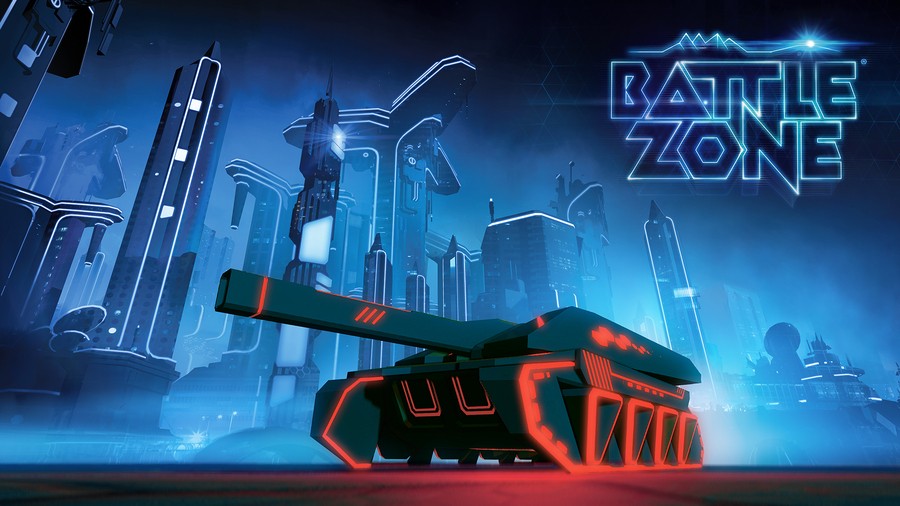
Even in an industry obsessed with reboots and remasters, Battlezone is the last brand that we'd expect to be making a comeback. And yet the timing is practically perfect: Atari's iconic upright arcade cabinet embodied virtual reality in the 1980s, and now with Project Morpheus poised to introduce a new era of PlayStation 4 gamers to the beauty of crude, colourful headsets, Rebellion has acquired the rights to the dormant tank destroying simulation. We recently caught up with the British-based studio's CEO Jason Kingsley and the all-new entry's lead game designer Steve Bristow to chat American auction houses, motion sickness, and a whole lot more.
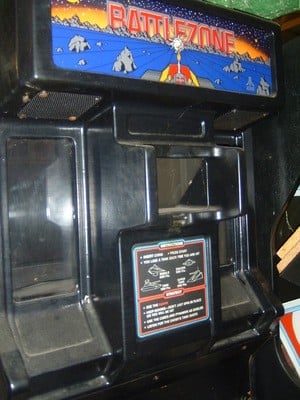
Push Square: We're fascinated about how you obtained ownership of the Battlezone IP. How did you learn that the property was going up for sale? Did you ever expect to actually get your hands on it? How does it feel being the owner of a franchise that clearly influenced your entire career?
Jason Kingsley: Rebellion has a vast and expansive network of genetically engineered special agents looking out for great business opportunities, of course. Or, more truthfully, I read about the sale on a website, got in contact with the auctioneers, followed their instructions, and finally ended up on the top floor of a very tall building in New York. And the opportunity to acquire the Battlezone IP came quickly. My brother and Rebellion co-founder, Chris, and I had to make some very rapid decisions about what we wanted to do.
Battlezone was a big influence on me as a kid, and as someone who'd go on to make games a decade later. It was a 'you are in the game' experience, completely different to the 'playing the game' experiences of other titles at the time. It allowed you to inhabit a world, not just play it.
So it's wonderful to be the curator of this IP. It's much like when we bought 2000 AD and now publish that comic weekly, alongside all of its supporting graphic novels and the Judge Dredd magazine. We've always thought of ourselves as guardians rather than owners of IPs, and that's no different when it comes to Battlezone.
When you acquired the IP, did you always have virtual reality platforms like Project Morpheus in mind? It seems fitting that the 'father of VR' should return in time for this new generation of VR – but was that something that you stumbled upon, or was it the intention all along?
JK: It was certainly part of the plan, in that we could see VR might one day become a reality commercially, and that Battlezone could be a natural fit. But the details of exactly how that could work were very sketchy at the time. Basically, we thought that acquiring the IP would be great, and afterwards we worked out what we might do with it.
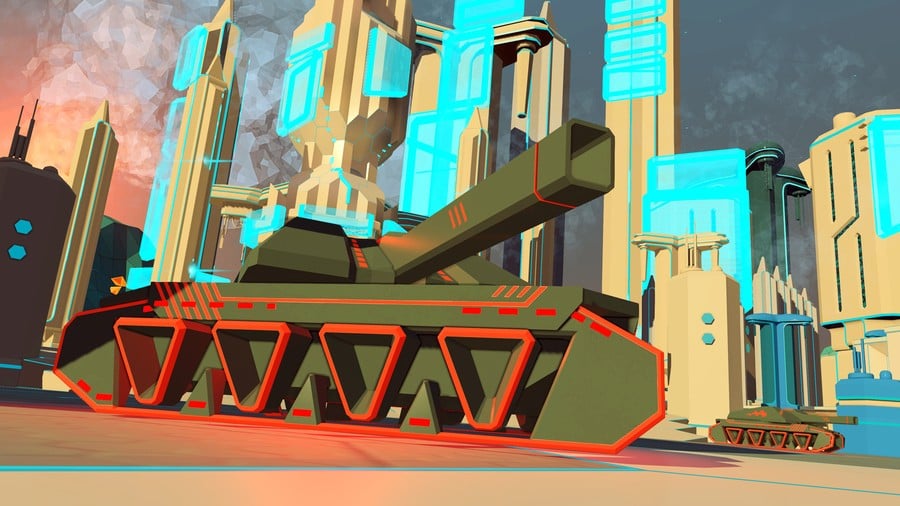
What elements of the original game have you decided to keep intact? Presumably you're trying to maintain a familiar feel, so what makes this a Battlezone game?
Steve Bristow: In addition to the obvious physical stuff – you're in a tank and you're fighting an army of enemies – we want to evoke our own childhood memories of arcades. I fondly remember walking into an arcade as a kid and discovering this huge array of new adventures, unique experiences, and amazing worlds to explore. VR really unlocks this in Battlezone because it feels so fresh, so unlike a conventional shooter game. It really recreates that kind of wide-eyed excitement that a new arcade and a bag of coins gave the 10-year-old me.
Following on from that: what new ideas of your own have you incorporated? How have you 'modernised' the experience?
SB: For me, the range of weapons and enemies that you'll encounter will feel significantly different to what you might be used to. We've got some really cool stuff like the swarm from the trailer, partly inspired by the crazy missiles from the original game. But now we've designed and evolved them for a virtual experience – and that makes a huge difference.
There are other things that we can't talk about just yet – but I will say that we're looking at how we can really deliver plenty of replay value. We're also considering some form of multiplayer, though nothing's confirmed just yet, but that feels like it could be a natural fit.
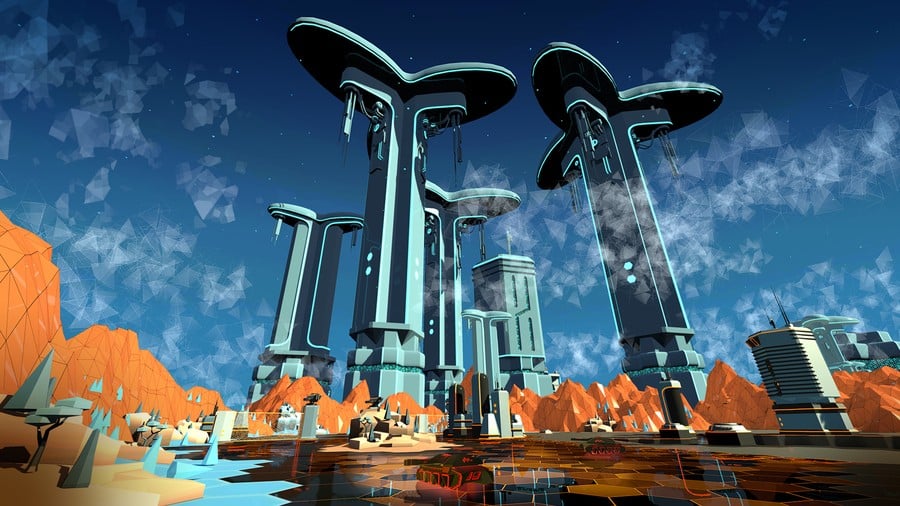
How hard is virtual reality to do right? What are the biggest challenges that you've faced during development? And how have you overcome issues such as motion sickness?
SB: For me as a designer, the hardest thing about VR, and therefore the most challenging and interesting thing, is that there isn't a playbook to refer to. Normally when you have a design problem, you can refer to a vast library of examples and essays written by people who've faced your problem before. With VR we're all pioneering and having to start from first principles, experimenting all of the time.
Our setup at Rebellion is pretty much ideal for that. We've got an experienced and agile team and a toolset that we make and maintain in-house, so putting together a prototype quickly isn't too hard. Tackling motion sickness has been a great example of that process working well – our early builds were causing problems for everyone. We speculated about some causes, made changes and tested again. Some of it was common sense stuff like framerate and the fidelity of head tracking, but we've found much less intuitive solutions have helped significantly, too. We've now reached a point where the comfort level is much more optimal, and we had excellent feedback about that from the people who tried our demo at E3. And we'll continue to keep experimenting and improving the experience.
JK: In many ways it reminds me of a couple of decades ago when we were starting to make Alien Vs Predator on the Atari Jaguar – one of the first FPS games. There were no rules, no guidelines for us, just a blank canvas of the sort of thing that we wanted to try, so we had to establish everything for ourselves. It was a heady mix of technological progress and gameplay innovation, and it is great to have that feeling again.
We quite like the Tron-esque art style that you've adopted. What were some of the inspirations behind that? Was it the rudimentary visuals of the original that influenced the angular look of the reboot?
JK: When making a reboot you have to acknowledge the past but also firmly move forwards into something new and different. On occasions when we've been reviewing what we call 'white boxes' for other games – think a blank space – it's always occurred to me that there's something beautiful about an un-textured play space. I suppose moving from there to computer-like lighting and colour shading wasn't too much of a leap. Battlezone is an artificial reality within a computer – the original game's depiction of artificial reality was actually an influence on movie titles like Tron. With the VR game, we wanted the graphical design to reflect that sense of digital unreality as fully as possible, while still remaining beautiful and modern.
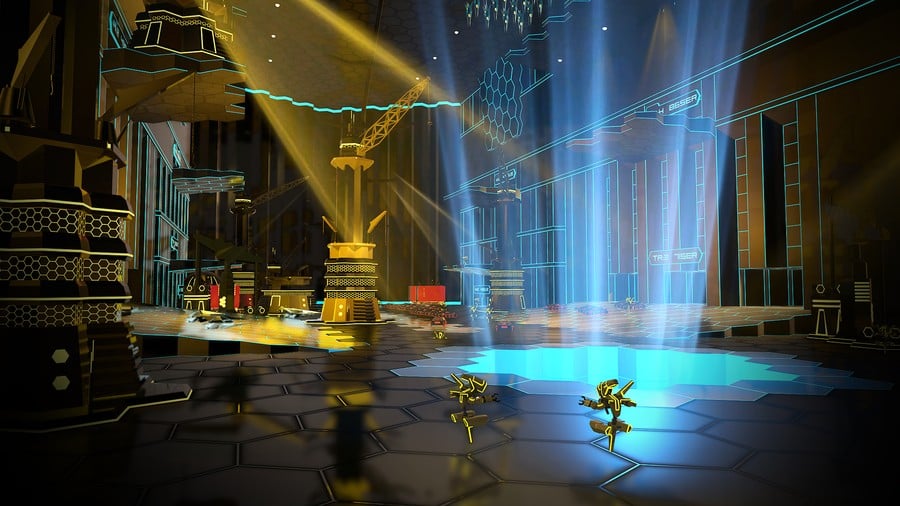
Can you talk about controls at all? There's a lot of PlayStation Move stuff in the works for Morpheus at the moment, but we assume that this will work with the DualShock 4?
SB: It will indeed work with the DualShock 4, and we're experimenting with having the controller represented in the game as an enhancement to that feeling of immersion and presence – and as an ideal way of giving button prompts! As far as other control systems go, PlayStation Move does offer interesting possibilities and as long as we can retain the kind of instant positive input and feedback that you get from a regular controller, it could work for an action game like Battlezone.
There's a lot of scepticism surrounding VR still. What do you think it will take to convince some of the space's detractors? Do you think that Battlezone will be able to change a sceptic's mind, and why?
SB: A lot of the stuff that people have tried on VR so far are really demos; we're still asking people to imagine what the games are going to be like when they're finished, so the scepticism is natural.
Also, VR does have a fundamental problem of selling itself through 2D video. You just can't get the experience across in that way. You really have to try it for yourself. I think that Battlezone is going to surprise people because if you've played tank games before, you probably think you know how it feels to sit in the cockpit of a fighting vehicle. But you put the HMD on and try the game out and you quickly feel the difference. It's the difference between playing an FPS and going paintballing. They're both cool but one of them feels more real, more intense, more close to reality.
Is there anything else that we need to know about Battlezone that you haven't had chance to tell us about yet?
JK: There's a lot more that we'd love to say about Battlezone, but it's still very early days for the project. But we'll be looking to reveal plenty more as things crystallize, so please stay tuned!
Will you be taking aim at Battlezone when it deploys for Project Morpheus on the PS4? Do you have fond memories of the original Atari arcade cabinet? Blow us away in the comments section below.





Comments 4
The trailer looks great. This is the sort of thing that will help sell morpheus and will hopefully convince the AAA studios that morpheus is worth investing in.
Studios like Rebellion deserve a lot of credit for this type of development. They're obviously passionate about the technology. If (more likely when!) I buy a Morpheus this will be high on my purchase list.
I think it's interesting that a lot of VR developers seem to be incorporating the controller into the game. And by that I mean - the controller's becoming a virtual object in a handful of games. I guess it makes it gives a sensation of grounding that can help with presence and motion sickness?
Oh ya. This is all me right here. This is a PS4 game not Morpheus, right?
@Bad-MuthaAdebisi Battlezone had an ambience unlike any other game. I hope Rebellion can nail that same feeling.
Leave A Comment
Hold on there, you need to login to post a comment...